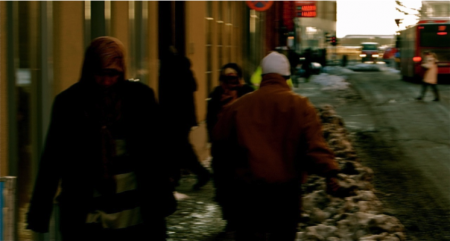One of Oslo’s most multi-cultural neighborhoods, Grønland, has suddenly emerged as an area far from the ideals of cultural and religious tolerance. Many immigrants claim it’s “more Muslim” than the countries they left, and newspaper Aftenposten reports that both they and others face harassment on the streets if they don’t conform to a code of conduct that some stricter Muslims try to impose.

A form of “morality police” has evolved in recent years, mostly in Grønland but also in other areas of the Norwegian capital, and its self-appointed members are making life difficult for their fellow immigrants and some ethnic Norwegians as well.
One man from Iran, who’s not Muslim, told Aftenposten that he was scolded by two strangers who spotted him eating during the religious holiday period when Muslims are supposed to fast from sunrise to sundown. He said they confronted him by aggressively demanding “Don’t you know it’s Ramadan? You should know better.”
Young immigrant women also face harassment if they’re spotted in fashionable western clothing that members of the “morality police” think are too revealing or not in line with Muslim standards. Some women report that they’ve been yelled at, been the target of unfriendly stares, spitting or worse.Gay men have also been harassed on the streets of Grønland and nearby Tøyen. Two men seen walking hand in hand through the neighborhood, which is home to several popular bars and cafés as well as some apartment buildings known for attracting gay residents, were verbally abused last summer. One gay man from Bergen told Aftenposten he moved to Grønland because he wanted to live in a multicultural neighborhood. Now he’s almost reluctant to leave his apartment because of hostility he can face on the streets.
Strong reaction
Reaction to Aftenposten’s original story in Saturday’s paper has raged all week. Among the first to react was the leader of Norway’s Islamic Council, Senaid Kobilica.
“It is completely unacceptable that some Muslims behave like morality police,” he told Aftenposten . He urged the imam at all of Oslo’s mosques to bring up the issue during Friday prayers.Kobilica said he was well aware that some Muslim men take it upon themselves to enforce their version of correct codes of dress and behaviour. Afshan Rafiq, a politician for the Conservative Party in Oslo, is aware of the harassment as well, and he thinks it stems from social indifference over the years, which has allowed minority groups to isolate themselves, without exposure to Norwegian norms and codes of conduct.
“We have followed a policy of being too kind, and haven’t made many demands on immigrant groups since the 1970s,” said Rafiq. “Therefore there’s a parallel system where people can follow their own norms.”
He said the government minister in charge of integration, Audun Lysbakken, “must dare to acknowledge that there’s a problem out there. Then he has to dare to deal with it, and use the channels that are available to start a dialogue with these people.”
‘Bullshit’
There were some indications later in the week that “these people” weren’t open to much dialogue. A group of Muslim men smoking outside a café in Grønland told Aftenposten that media reports about the “morality police” were “bullshit,” and untrue. They denied that Muslim men verbally abused or harassed young Muslim women, adding, though, that “if they spit, it’s only after she’s passed, so she doesn’t see it.” They later admitted there was some evidence of harassment.
Hadia Tajik, a member of Parliament for the Labour Party, said the issue needs to be tackled by the immigrants themselves. She drew parallels to Norway’s own janteloven and myths about “the monster of the village” (bygdedyret) , which demand conformity and are “allergic to diversity.”
Tajik, the daughter in an immigrant family herself, described a “closed society” where people are supposed to “know their place” and not show feelings. She said that some Muslim men, even young men, have written to her and complained about her own dress, “telling me I should cover myself more and speak more with God.”
She thinks the “morality police” represents a conflict between traditional and modern values. Government programs aimed at boosting integration can weaken the “village monster,” but won’t eliminate it.
“That’s why it’s good that Senaid Kobilica, leader of the Islamic Council, has clearly labelled the morality police as unacceptable,” she wrote in a commentary in Aftenposten . “The village monster has no more power than what we give it.”

